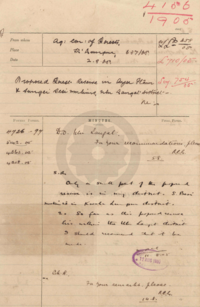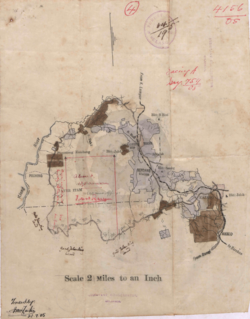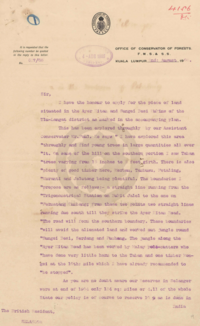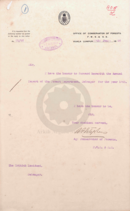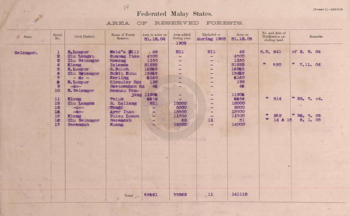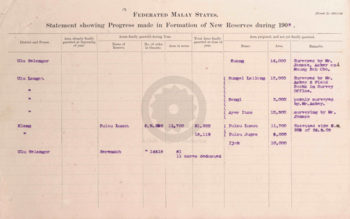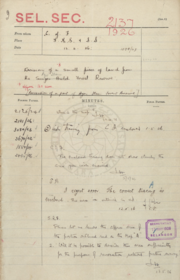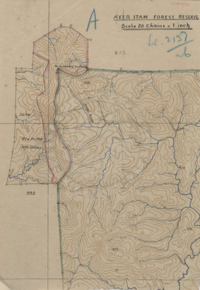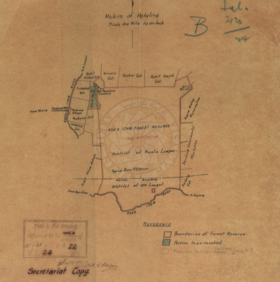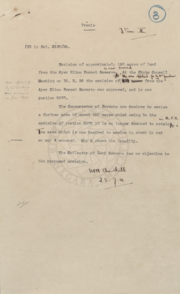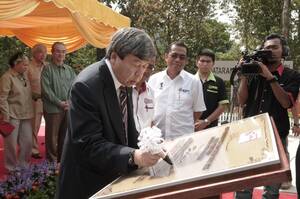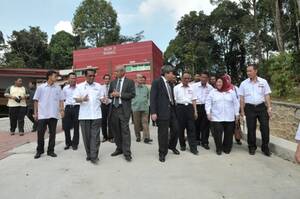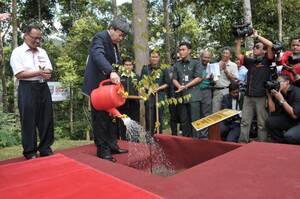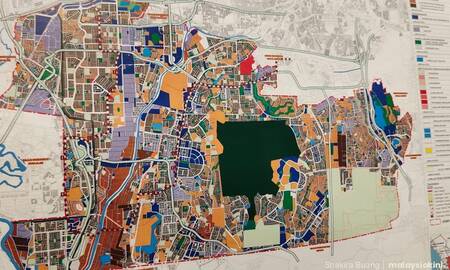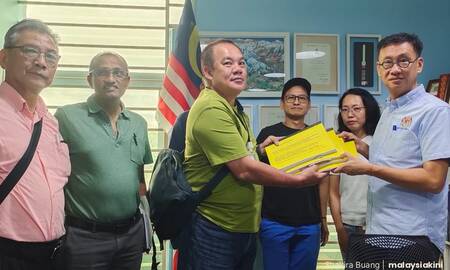Jadual Kandungan
Hutan Simpan Ayer Itam (1905-kini)

Pemandangan Hutan Simpan Ayer Hitam, menghadap ke selatan, di pinggir Bandar Puteri: “Ayer Hitam Forest Reserve ( 360 view of Bandar Puteri )” (曼谷Expats自駕走遍泰國 , 13 Oct 2017: "Ayer Hitam Forest Reserve ( 360 view of Bandar Puteri )").
Dirujuk oleh
Perihal
“Hutan Simpan Ayer Hitam (HSAH) terletak 20 km dari Universiti Putra Malaysia (UPM), Serdang Selangor, 45 km dari kesibukan kotaraya Kuala Lumpur dan 25 km dari pentadbiran Putrajaya. Terletak di tengah-tengah bandar Puchong yang pesat membangun dengan kepadatan penduduk yang tinggi, di sinilah tersembunyinya ‘Paru-Paru Hijau Lembah Klang’ Hutan Simpan Ayer Hitam. Berkeluasan 1182.07 hektar, hutan ini masih kekal dengan kehijauan flora dan kepelbagaian faunanya. Di sini juga terletaknya Pusat Pendidikan Perhutanan Sultan Idris Shah (SISFEC) yang menguruskan segala aktiviti penyelidikan dan pendidikan di HSAH.
Terdapat 430 spesies tumbuhan berbiji, 33 spesies paku pakis, 127 spesies balak, 29 spesies buah hutan dan 121 spesies tumbuhan ubatan yang terdapat di hutan ini. Bagi kategori fauna, kira-kira 208 spesis burung, lima spesies primat, 15 spesies kelawar, 17 mamalia kecil tidak terbang, 10 spesies reptilia, 39 spesies katak dan 11 spesies ikan. Kepelbagaian spesies flora dan fauna di dalam hutan simpan ini telah mewujudkan satu ekosistem yang melengkapi dan saling menyokong antara satu sama lain.
Keunikan hutan ini bukan sahaja terhadap kepelbagaian flora dan faunanya, tetapi juga dengan kehadiran penghuni asal hutan simpan ini iaitu orang asli dari suku Temuan yang masih menggunakan hutan ini. Suku Temuan dari dua buah kampung iaitu Kampung Sungai Rasau Hilir dan Taman Orang Asli Saujana Puchong dikatakan telah tinggal di dalam hutan ini sejak 400 tahun lamanya. Sehingga kini walaupun telah mengecapi arus permodenan, dan tidak lagi tinggal di dalam hutan, mereka masih menggunakan hutan ini untuk mengutip hasil hutan, menjalankan aktiviti keramaian dan upacara tradisi kaum mereka.”
(Sumber: Mohd Naeem Abdul Hafiz Bin Mohd Hafiz (UPM), Prof. Madya Dr. Marina Mohd. Top @ Mohd. Tah (UPM), 12/08/2020: |"Hutan Simpan Ayer Hitam & Geronggang").
“This forest reserve is one of the few remaining lowland forest reserves left in the State of Selangor. It was leased to UPM through a memorandum of understanding (MoU) signed in 1996 which gives Universiti Putra Malaysia
(UPM) “custody” of the reserve for 80 years for use in education and research. It is an excellent demonstration area for students to learn about various aspects of forestry. In addition, the forest area offers research opportunities for scientists interested in the working of a tropical lowland forest ecosystem. It also serves as an important “green lung” for the urban city of Kuala Lumpur.
Considering the factors mentioned above, a general function of AHFR is to promote the protection of a lowland forest ecosystem that would serve the needs for education, research and recreation not only for the UPM community
but also the urban areas (Petaling Jaya, Subang Jaya, Kelang, Kuala Lumpur) and dwellers surrounding the forest reserve (Seri Serdang, Seri Kembangan, Puchong, Kajang and Bangi). Towards this objective, the management plan
for AHFR has been prepared with three broad goals as follows:
• to promote systematic and coordinated research into the working of a lowland rain forest ecosystem;
• to provide training areas in forest biology, forest production, forest management, environment, medicinal plants, microclimate and other related disciplines; and
• to offer opportunities for forest recreation and ecotourism for local as well as the surrounding urban communities.”
(Sumber: Awang Noor, A.G., Norini, H., Khamurudin, M.N., Ahmad Ainuddin, N. and Ismariah, A., |"Valuing the Rain Forest: The Economic Values of Selected Forest Goods and Services in Ayer Hitam Forest Reserve, Puchong, Selangor", PERTANIKA JOURNAL OF TROPICAL AGRICULTURAL SCIENCE, JTAS Vol. 30 (2) Aug. 2007, hlm.143).
“The forest's original area covered 4,270.7 hectares which was gazetted as a closed forest reserve in 1906; however, the size has since dropped to 1,176.1 hectares due to rapid development and industrialisation activities. Awang Noor et al. (2007) claimed that it has lost almost 68% of its forested area within 14 years from 1983 to 1997.” (Mohd Kher Hussein, Mohd Johari Mohd Yusof and Nor Syuriaty Jaafar @ Journal of Construction in Developing Countries, 25(2), 153–173, 2020: |"An Observational Study on Forest Landscape Conservation in Malaysia via the Establishment of Forestry Educational Centres", m.s.2).
“The Ayer Hitam forest reserve in Puchong is one of the most precious tracts of remaining lowland dipterocarp forest in highly urbanized Selangor state. Originally covering 4270 hectares and gazetted as a forest reserve way back in 1906, it has suffered from a series of de-gazettements throughout the years, until it is now only some 1200 hectares. Even this is being reduced as I speak, as developers continue to quietly eat away at the borders of the reserve. The forest is now totally surrounded by “concrete jungle”. The reserve is leased out to a nearby local university, University Putra Malaysia (UPM) since the 1990s, for 80 years, as a living “laboratory” for students to conduct research, but as I see it, its future is far from assured. Another tract of forest towards the north, the Bukit Cherakah forest reserve, has already suffered greatly from surrounding housing development despite being the nation’s Agro-Forestry Park, and is rapidly being whittled down to a few hundred hectares from its original 1300 hectares; the Ayer Hitam forest reserve will likely end up the same way as well.” (JungleBoy @ RAINFOREST JOURNAL, August 10, 2012: |"Ayer Hitam Forest Reserve, Puchong").
1905-08-02: Proses Pewartaan
Pada 8 Februari 1905, Office of Conservator of Forests F.M.S. & S.S., di bawah seliaan pegawai perhutanan Arthur Bligh (A.B.) Stephens, memohon sebidang tanah di antara Ayer Itam dan Sungei Besi untuk tujuan pewartaan sebagai hutan simpan. Menurut laporan pembantu beliau Mr. Paul, terdapat banyak pokok Taban (Gutta Percha) muda berukur lilit antara 18 inci hingga 3 kaki, juga banyak pokok balak spesis Merbau, Tembusu, Petaling, Meranti dan Jelutong. Cadangan sempadannya bermula dari stesen trigonometri di puncak Permatang Kumbang dan Bukit Jalel hingga ke Jalan Ayer Itam. Selain itu, pewartaan ini juga penting bagi negeri Selangor untuk mencapai sasaran luas rizab hutan simpannya agar meliputi 10% daripada jumlah keluasan negeri, sebagaimana yang telah ditetapkan di India:-
“I have the honour to apply for the piece of land situated in the Ayer Itam and Sungei Besi Mukims of the Ulu-Langat district as marked in the accompanying plan. This has been explored thoroughly by our Assistant Conservator Mr.Paul. He says “I have explored this area throughly and find young trees in large quantities all over it. On some of the hill on the southern portion I saw Taban trees varying from 18 inches to 3 feet in girth. There is also plenty of good timber here, Merbau, Tembusu, Petaling, Meranti and Jelutong being plentiful. The boundaries I propose are as follows:- a straight line running from the Trigonometrical Station on Bukit Jalel to the one on Permatang Kumbang; from these two points two straight lines running due south till they strike the Ayer Hitam Road. The road will form the southern boundary. These boundaries will avoid the alienated land and worked out jungle round Sungei Besi, Serdang and Puchong. The jungle along the Ayer Hitam Road has been worked by Malay pole-cutters who have done very little harm to the Taban and one timber kongsi at the 10th: mile which I have already recommended to be stopped”. As you are no doubt aware our Reserves in Selangor were at end of 1904 only 134sq: miles or 4.11 of the whole State our policy is of course to reserve 10% as is done in India. … - A.B. Stephens”
Terdapat sedikit kekhuatiran bahawa pewartaan ini mengurangkan sumber kayu api untuk kegiatan perlombongan di Sungei Besi: “I see no objection to the proposed reserve except that the Sungei Besi Miners will have their principal supply of firewood taken away.”
A.B. Stephens menjelaskan, masih terdapat banyak sumber kayu api di sekitar Jalan Cheras dan Jalan Ayer Itam, serta pinggir hutan simpan cadangan. Jika tidak mencukupi sekalipun, hutan simpan masih boleh dinyahwartakan setiap tahun secara berperingkat. Jika tidak diwartakan, sumber tersebut akan habis lebih cepat, lalu menyebabkan kenaikan harga bahan api, sebagaimana yang telah berlaku di Kuala Lumpur: “The above objection does not hold good as there is no lack of firewood adjoining the road to Cheras and 1st to 5th mile Ayer Itam road both sides. Also for 2 miles on every side of the reserve. It is just in such places we want to Reserve for the benefit of the miners as where all other sources fail we would open the Reserve to the woodcutters in yearly coupes. If this had been done when I suggested it around K L in 1897 we should not now have to pay such a price for our firewood. ? my report to the Resident about that year.”
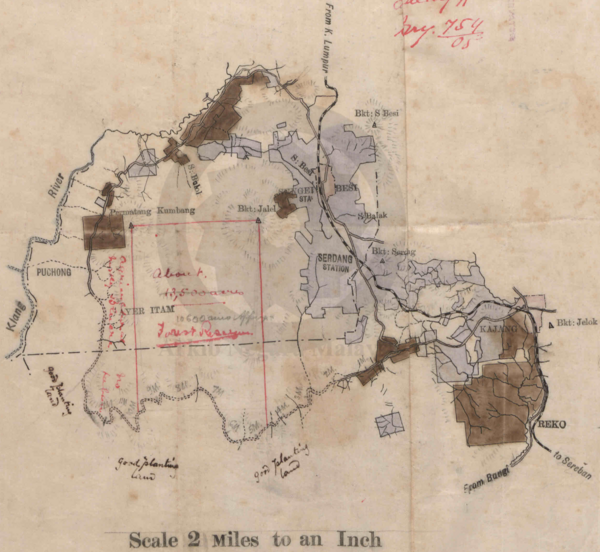
Cadangan Awal Hutan Ayer Itam (21 Julai 1905).
Beliau seterusnya memohon untuk memperluaskan lagi sempadan hutan agar meliputi keseluruhan kedua-dua bukit Permatang Kumbang dan Bukit Jalel: “Yes I spoke to the Resident about including the two Hills (all available parts of Itam) in the Reserve I mean those with the Trig stations on them in NW & NE corners. He agreed to this.”
Berikutan permohonan pindaan ini, tinjauan semula terpaksa dibuat di kawasan tersebut pada 14 November 1905, dan berlarutan sehingga akhirnya diwartakan lebih setahun kemudian (Gazette No. 743 of 1906, sekitar Disember 1906).
(Sumber: PEJABAT SETIAUSAHA KERAJAAN NEGERI SELANGOR, 02/08/1905: |"PORPOSED FOREST RESERVE IN AYER ITAM AND SUNGEI BESI MUKIMS, ULU LANGAT DISTRICT - RE :-").
1906-01-29: Laporan Tahunan Hutan Selangor (1905)
Laporan tinjauan kawasan-kawasan cadangan hutan simpan di Kuang, Sungei Lallang, Bangi, Ayer Itam, Sungei Guntong, Pulau Lumut, Pulau Jugra, dan Ijok, di bawah seliaan A.B. Stephens. Tinjauan Hutan Simpan Ayer Itam sedang dijalankan oleh Mr. Jansze, Forest Surveyor:-
“Ayer Itam, and Ulu Gombak were proposed as Forest Reserves. Work on the former is being carried on by Mr: Jansze - Forest Surveyor, while the latter is being left for want of a Surveyor. Both these reserves contain valuable timber and taban. … Mr: Jansze very nearly finished the extention of the Rantau Panjang reserve, when heavy rains compelled him to stop work. He was then sent to Ayer Itam and is still going on with that work. The sum of $9745.03 was expended during the year on this work.”
(Sumber: PEJABAT SETIAUSAHA KERAJAAN NEGERI SELANGOR, 29/01/1906: |"ANNUAL REPORT OF THE FOREST DEPARTMENT, SELANGOR, FOR THE YEAR 1905").
1905-10/11: Harimau di Jalan Ayer Itam
Pada Oktober atau November 1905, seorang pemotong kayu telah diserang seekor harimau di sekitar Bangi. Di dalam pergelutan itu, dengan bersenjatakan sebilah kapak, beliau telah menetak salah satu kaki belakang harimau itu sebanyak dua kali, lalu berjaya melepaskan dirinya.
Kira-kira satu atau dua bulan kemudian, pada pagi 7 Disember 1905, telah berlaku satu lagi serangan harimau di suatu lokasi terpencil di pinggir Hutan Ayer Itam.
Kronologi peristiwa:-
- 7/12, 8 pagi: Harimau menyerang 3 orang pemotong kayu yang sedang keluar bekerja, 1.5 batu dari kediaman mereka di Batu 9 Jalan Ayer Hitam (13.5 batu / 21.7 kilometer dari Kajang). Salah seorang daripada mereka menetak kepala harimau tersebut dengan sebilah parang. Harimau tersebut melarikan diri, dan semua terselamat.
- 7/12, 11.30 pagi: Harimau yang sama mengekori salah seorang pemotong kayu sejauh satu batu, sebelum menyerang lalu membunuhnya. Mayatnya dibawa lari.
- 8/12: Pasukan pencari dari Kajang, diketuai oleh individu bernama “Mr. Hay”, berjaya menemui mayat pemotong kayu tersebut. Jerat “spring gun” dipasang di lokasi tersebut. Selepas tengah malam, bunyi das tembakan kedengaran, menandakan jerat telah mengena.
- 9/12 (pagi): Terdapat kesan darah di lokasi, dan bangkai harimau ditemui beberapa ela dari situ.
- 9/12 (malam): Bangkai harimau dibawa ke Kajang untuk dibedah siasat. Ukuran panjang badannya 8 kaki 8 inci (2.6 meter), dan dianggap agak besar. Di kakinya terdapat dua kesan luka tetakan, kemungkinan besar oleh pemotong kayu di Bangi 1-2 bulan sebelumnya.
Kulit harimau ini kemudiannya dibawa ke Muzium Kuala Lumpur, yang baru saja siap dibina. Mr. Hay pula telah dibayar upah sebanyak $50 oleh pihak pentadbiran British, lebih satu kali ganda daripada kadar biasa ketika itu iaitu $25.
Sepanjang tahun 1905 itu, sejumlah 16 orang mangsa korban harimau telah direkodkan di sekitar Jalan Ayer Itam. Setelah terbunuhnya harimau ini, tiada lagi serangan harimau dilaporkan di situ. Berdasarkan pemerhatian ini, kemungkinan juga mangsa-mangsa tersebut adalah korban harimau yang sama.
Ketika peristiwa ini berlaku, pekan Bangi sedang dibangunkan (dibuka tahun 1902), dan bahagian jalan yang menghubungkan Kajang dengan Ayer Itam baru saja dibina (diturap sepenuhnya tahun 1906). Kawasan hutan di sekitar Bangi dan Ayer Itam pula sedang dalam proses pewartaan sebagai hutan simpan (diwartakan tahun 1906).
Sumber:-
| Tarikh | Butiran Keratan | |
|---|---|---|
| | 1905.12.16 | "A Man-eater Killed.". Straits Echo, 16 December 1905, Page 2 |
| | 1905.12.21 | "MAN-EATER KILLED AT ULU LAN GAT". The Singapore Free Press and Mercantile Advertiser (Weekly), 21 December 1905, Page 397 |
Gambaran lokasi secara kasar:-
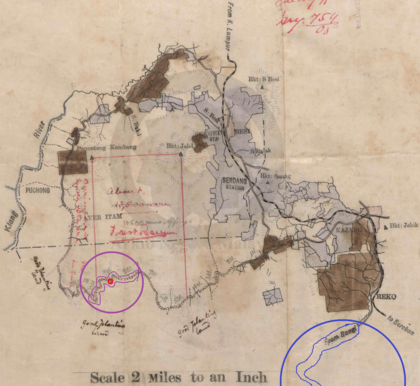

Anggaran kawasan serangan harimau di pinggir Hutan Ayer Itam pada 7/12/1905.
Kiri: Berdasarkan peta yang hampir dengan tarikh kejadian (PEJABAT SETIAUSAHA KERAJAAN NEGERI SELANGOR, 02/08/1905: |"PORPOSED FOREST RESERVE IN AYER ITAM AND SUNGEI BESI MUKIMS, ULU LANGAT DISTRICT - RE :-").
Kanan: Berdasarkan Mapcarta, kini. Lokasinya di sekitar Kampung Pulau Meranti.
Titik merah: kediaman mangsa di Batu 9, Jalan Ayer Itam.
Bulatan ungu: kemungkinan sekitar kawasan serangan, iaitu sekitar 1.5 batu dari lokasi kediaman.
Bulatan biru: kemungkinan kawasan serangan di Bangi, 1-2 bulan sebelumnya.
Mr. Hay, individu yang berjaya membunuh harimau ini, dianugerahi upah sebanyak $50 (kadar biasa: $25) oleh pihak pentadbiran British, sebagaimana budaya lazimnya ketika itu: “There appears to be no doubt that this was a man-eater, judging by the account published in The Malay Mail. … The D.O. may pay the double reward. $50.” (PEJABAT SETIAUSAHA KERAJAAN NEGERI SELANGOR @ Arkib Negara Malaysia, 11/12/1905: |"REWARD TO MR. HAY FOR KILLING A TIGER - RE :-").
MAKLUMAT LANJUT: William Hay.
Ketika pendudukan Jepun, pada 10 Mac 1945, Muzium Kuala Lumpur telah terkena bom tentera udara Amerika Syarikat, menyebabkan kesemua koleksi bahan pameran yang terletak di bahagian kanan bangunan muzium mengalami kemusnahan. Koleksi muzium yang terselamat ditempatkan sementara di bilik darjah di Sekolah Convent Bukit Nenas, Kuala Lumpur sehingga akhir tahun 1945. Setelah British kembali memerintah, muzium sementara dibina pada 11 Februari 1953, sebelum dirobohkan pada tahun 1958, digantikan dengan Muzium Negara kini, yang siap sekitar tahun 1963. Tidak dapat dipastikan sama ada kulit harimau tersebut telah musnah atau hilang di sepanjang peristiwa ini. (Sumber: Jabatan Muzium Malaysia, 2016: |"Laporan Tahunan 2016", m.s.27-28).
Liputan peristiwa serangan harimau yang mungkin ada kaitan:-
- “A Chinese wood-cutter has fallen a victim to a tiger four miles from Sungei Besi in Selangor. The poor fellow's coat was found in the afternoon on the 14th June, and the searchers came across great quantities of blood but no remains have been discovered. This, according to the Malay Mail, is the fourth victim recently in that neighborhood, and presumably the same tiger, which, judging by the footprints, is a huge beast.” (The Straits Times, 20 June 1905, Page 5: |"Untitled").
- Harimau hanya memakan manusia bila terdesak atau mengalami kecederaan atau kecacatan. Ia juga boleh merayau hingga sejauh 35 batu (Straits Echo, 2 August 1905, Page 4: |"Man-eaters").
- “Mr. O.F.Stonor, of Kuala Kubu, writes… All the recent cases in Ulu Langat have occured, again roughly speaking, within a radius of about five miles from Kajang. This can scarcely be considered an extraordinarily wide beat for a tiger; and I am prepared to lay a modest wager that the destruction of a single authenticated man-eater will put an effectual stop to the whole business.” (Straits Echo, 2 August 1905, Page 5: |"Man-Eating Extraordinary").
- “A tiger carried off a Chinese wood-cutter within a mile of Sungei Besi on Saturday last, while the man was at work with a companion.” (Eastern Daily Mail and Straits Morning Advertiser, 24 November 1905, Page 1: |"STATES DAY BY DAY").
LATAR PERISTIWA: Harimau Malaya
LATAR PERISTIWA: Jalan Ayer Itam
LATAR PERISTIWA: Muzium Kuala Lumpur / Muzium Negara
1926-04-13: Penyahwartaan Awal
Sepanjang pertengahan pertama kurun ke-20, secara umumnya hutan ini agak terpelihara, walaupun terdapat sedikit penyahwartaan beberapa kawasan kecil di bahagian sempadannya. Antara contoh rekod tersebut ialah pada 13 April 1926, di mana 2 siri penyahwartaan telah diluluskan:-
- 18 Februari 1926: 160 ekar (portion 2670) telah dinyahwartakan.
- 13 April 1926, permohonan penyahwartaan 160 ekar lagi. Ianya diluluskan pada 4 Ogos 1926.
“Excision of approximately 160 acres of land from the Ayer Hitam Forest Reserve is now desired. At the State Council Meeting on 18.2.26 the excision of the area applied for by Mr. Gardner(?) from the Ayer Hitam Forest Reserve was approved, and is now portion 2670. The conservator of Forests now desires to excise a further area of about 160 acres which owing to the excision of portion 2670 it is no longer desired to retain in the F.R. The area which is now desired to excise is shown in red on map A annexed. Map B shows the locality. The Collector of Land Revenue has no objection to the proposed excision. - WFN Churchill, 25.7.26.
State Council 29.7.26: The excision of approximately 160 acres is approved as desired by C of F. - WFN Churchill, 4.8.26.”
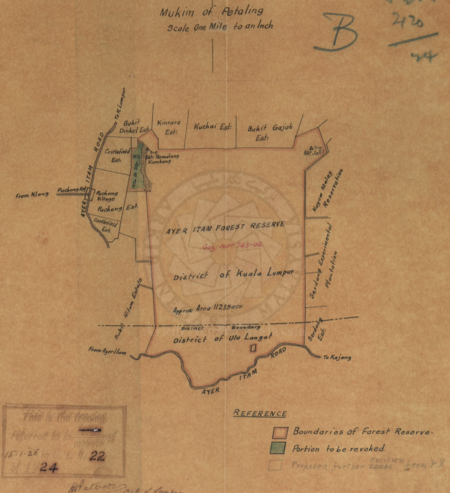
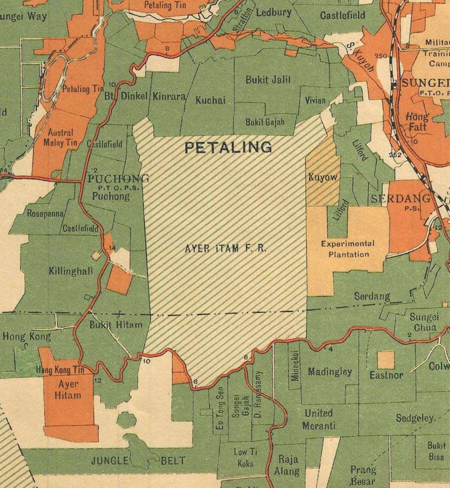
Kiri: Peta Hutan Simpan Ayer Itam, ketika penyahwartaan sebahagian kecilnya (kawasan berlorek di sebelah barat laut) dibuat pada 13 April 1926.
Kanan: Peta Hutan Simpan Ayer Itam, tahun 1929 (berdasarkan peta Edward Stanford @ F.M.S. Survey Department, 1929: |"1929 F.M.S. Wall Map of Selangor (Kuala Lumpur)").
(Sumber: PEJABAT SETIAUSAHA KERAJAAN NEGERI SELANGOR, 13/04/1926: |"EXCISION OF A SMALL PIECE OF LAND FROM THE AYER ITAM FOREST RESERVE [REVOCATION OF A PART OF AYER ITAM FOREST RESERVE]").
Selain penyahwartaan di atas, terdapat juga sedikit aktiviti ekonomi yang dijalankan secara terkawal di dalam kawasan hutan simpan ini:-
- 1925-03-03: Pemotongan kayu api (PEJABAT SETIAUSAHA KERAJAAN NEGERI SELANGOR, 03/03/1925: |"PETITION REGARDING A POWER OF ATTORNEY GIVEN TO HIM FOR CUTTING FIREWOOD IN AYER ITAM FOREST RESERVE").
- 1927-06-01: Permohonan perlombongan di kawasan paya, tidak pasti ianya diluluskan atau tidak (PEJABAT SETIAUSAHA KERAJAAN NEGERI SELANGOR, 01/06/1927: |"APPLICATION BY MR. J.A. RUSSELL FOR A PERMIT TO PROSPECT OVER THE AREAS OF SWAMP IN THE AYER ITAM RESERVE :").
- 1933-02-11: Terdapat rel tram, mungkin pernah digunakan untuk mengeluarkan hasil hutan (PEJABAT SETIAUSAHA KERAJAAN NEGERI SELANGOR, 11/02/1933: |"LENDING OF THE TRAMWAY, AYER ITAM FOREST RESERVE").
Peta Hutan Simpan Ayer Itam: 1929 dan 1950

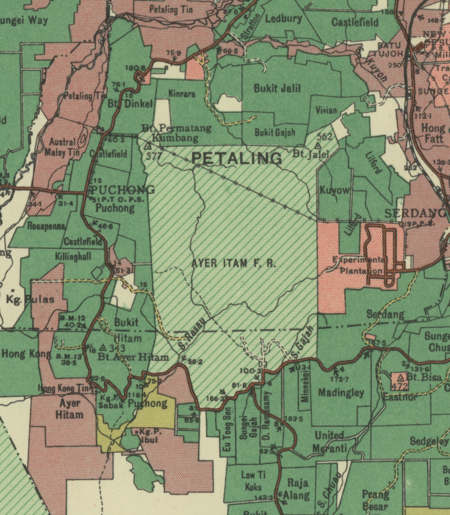
Kiri: Peta Hutan Simpan Ayer Itam, tahun 1929 (berdasarkan peta Edward Stanford @ F.M.S. Survey Department, 1929: |"1929 F.M.S. Wall Map of Selangor (Kuala Lumpur)").
Kanan: Peta Hutan Simpan Ayer Itam, tahun 1950 (berdasarkan peta Surveyor General, Malaya, 1950 @ Australian National University: |"Malaysia, Malaya, Selangor 1950, Land Use, South Sheet, 1950, 1:126 720").
Umumnya persempadanan Hutan Simpan Ayer Itam ketika ini masih kekal sebagaimana sebelumnya.
1936-1965: Penebangan Terpilih
Sepanjang tahun 1936 hingga 1965, terdapat rekod penebangan terpilih dijalankan di hutan ini, namun pada umumnya masih terpelihara: “Based on the observation, it was found that SISFEC has a valuable biodiversity of genetics, species and ecosystem levels. Its natural landscape has been conserved properly and kept in good condition (as shown in Figure 3) even though historically this site was selectively logged several times ago between the years of 1936 to 1965.” (Mohd Kher Hussein, Mohd Johari Mohd Yusof and Nor Syuriaty Jaafar @ Journal of Construction in Developing Countries, 25(2), 153–173, 2020: |"An Observational Study on Forest Landscape Conservation in Malaysia via the Establishment of Forestry Educational Centres", m.s.11).
“The forest is a production forest belonging to the forest type Lowland Dipterocarp Forest. It is classified as a secondary disturbed forest because it has been logged and treated several times since the 1930s (Paiman and Amat Ramsa, n.d.).” (Awang Noor, A.G., Norini, H., Khamurudin, M.N., Ahmad Ainuddin, N. and Ismariah, A., |"Valuing the Rain Forest: The Economic Values of Selected Forest Goods and Services in Ayer Hitam Forest Reserve, Puchong, Selangor", PERTANIKA JOURNAL OF TROPICAL AGRICULTURAL SCIENCE, JTAS Vol. 30 (2) Aug. 2007, hlm.142).
1983-1997: Siri Penyahwartaan
Hutan Simpan Ayer Hitam telah mengecil dengan agak drastik (dari 4,270.7 kepada 1,176.1 hektar) akibat pembangunan yang pesat, melalui penyahwartaan secara berperingkat, kebanyakannya berlaku sepanjang tahun 1983 hingga 1997: “The forest's original area covered 4,270.7 hectares which was gazetted as a closed forest reserve in 1906; however, the size has since dropped to 1,176.1 hectares due to rapid development and industrialisation activities. Awang Noor et al. (2007) claimed that it has lost almost 68% of its forested area within 14 years from 1983 to 1997.” (Mohd Kher Hussein, Mohd Johari Mohd Yusof and Nor Syuriaty Jaafar @ Journal of Construction in Developing Countries, 25(2), 153–173, 2020: |"An Observational Study on Forest Landscape Conservation in Malaysia via the Establishment of Forestry Educational Centres", m.s.2).
Statistik Penyahwartaan (Awang Noor et al., 2007)
TABLE 1: Extents of Ayer Hitam Forest Reserve, Puchong, Selangor and area losses (1965-1997) (Rajah asal: ![]() ).
).
| Year | Forested area (ha) | Percentage of area loss (compared to base year 1965) |
|---|---|---|
| 1965 | 4266.23 | |
| 1980 | 4006.00 | 6.1 |
| 1983 | 4006.00 | 6.1 |
| 1993 | 2198.00 | 48.5 |
| 1994 | 1964.00 | 54.0 |
| 1997 | 1262.23[1] | 70.4 |
“[1] The total area reported by the Selangor State Forestry Department is less than the area given to UPM (1248 ha) may due to ground survey error.
Source: Annual Report, State Forestry Department (various years) and District Forest Office Selangor Tengah, Cheras.”
TABLE 2: Conversions of Ayer Hitam Forest Reserve (AHFR) to other uses (Rajah asal: ![]()
| Year | Use | Area (ha) |
|---|---|---|
| 1970 | Grazing | 62.70 |
| 1973 | Agriculture | 240 |
| 1988 | Agriculture | 623.4 |
| 1989 | Agriculture | 658 |
| 1989 | Agriculture | 148 |
| 1993 | Dumping site | 58 |
| 1994 | Settlement | 11.3 |
| 1994 | Rec./ Housing | 222.6 |
| 1995 | Housing | 324.2 |
| 1995 | Housing | 112 |
| 1995 | Housing | 447.2 |
| Total | 3007.4 |
(Sumber: Awang Noor, A.G., Norini, H., Khamurudin, M.N., Ahmad Ainuddin, N. and Ismariah, A., |"Valuing the Rain Forest: The Economic Values of Selected Forest Goods and Services in Ayer Hitam Forest Reserve, Puchong, Selangor", PERTANIKA JOURNAL OF TROPICAL AGRICULTURAL SCIENCE, JTAS Vol. 30 (2) Aug. 2007, hlm.142-143).
Awal 1980-an: Pembinaan Jalan Puchong Batu 13 sehingga ke pekan Serdang

“Siapa yang tinggal di kawasan Puchong-Serdang tentu tidak akan cam tempat ini. Pada awal tahun 80-an JKR membina jalan raya dari Puchong Batu 13 sehingga ke pekan Serdang melalui hutan belantara Air Hitam Forest Reserves. Saya bertugas sebagai Wakil Tapak JKR @ Resident Engineer mengawasi pembinaan hiway baru tersebut. Sekarang ini penuh dengan township baru dan jalan ini sebahagian dari Equine Park. Pengalaman bekerja di situ termasuk kendalian dengan Tok Batin komuniti orang asli, binatang buas seperti beruang, harimau dan ular tedung 20' serta penunggu hutan yang mengacau kami. Semua diceritakan dalam buku ke-2 saya. - Ir.Hj.Zainuddin.Bin.Hj.Omar * kawasan hutan di mana Equine Park sekarang ini.” (Ir. Hj. Zainuddin bin Hj Omar @ Facebook, 5 April 2024: "Siapa yang tinggal di kawasan Puchong-Serdang tentu tidak akan cam tempat ini").
Perbandingan 1950-Kini

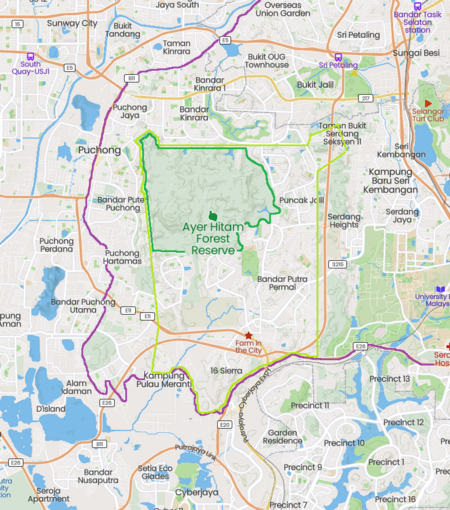
Kiri: Peta Hutan Simpan Ayer Itam, tahun 1950 (berdasarkan peta Surveyor General, Malaya, 1950 @ Australian National University: |"Malaysia, Malaya, Selangor 1950, Land Use, South Sheet, 1950, 1:126 720").
Kanan: Peta Hutan Simpan Ayer Itam, kini, secara kasar, berdasarkan peta Mapcarta. Garis Ungu: Jalan Ayer Itam - Klang Lama. Garis Hijau Muda: Sempadan asal Hutan Simpan. Garis Hijau Tua: Sempadan Hutan Simpan kini.
Bahagian barat laut (hulu Sungai Rasau) masih terpelihara berbanding bahagian lain: “Through observation also, it can be seen clearly that SISFEC still contains an untouched river landscape enclosed by the surrounding hills and have not suffered great disturbance. The river water is crystal clear, and teeming with aquatic life like fishes, shrimp, algae and specialised flora. The rocks are not the typical granite boulders, but seem to be sandstone, forming slow moving streams with deep pools, white sand banks and small delightful (terraced) waterfalls throughout their length. The riverine flora is dominated by the elegant Dipteris lobbiana and a grass-like rheophyte. Three main rivers landscapes found in this area namely the Rasau, Biring and Nasih Rivers (as shown in Figure 4). However, the Nasih and Biring River have been severely compromised by land development.” (Mohd Kher Hussein, Mohd Johari Mohd Yusof and Nor Syuriaty Jaafar @ Journal of Construction in Developing Countries, 25(2), 153–173, 2020: |"An Observational Study on Forest Landscape Conservation in Malaysia via the Establishment of Forestry Educational Centres", m.s.12).
Merujuk perbandingan di antara peta tahun 1950 dan kini di atas, bahagian selatan paling banyak dinyahwartakan, iaitu lebih separuh daripada keluasan keseluruhan. Ianya kini direntasi oleh Lebuhraya Putrajaya-Cyberjaya / Putrajaya-Cyberjaya Expressway (Federal Route 29) dan South Klang Valley Expressway (SKVE E26), serta petempatan-petempatan di sekitarnya, antaranya Bandar Bukit Puchong, Taman Saujana Puchong, Taman Lestari Puchong, Kota Perdana, Bandar Putra Permai (termasuk Alice Smith School), Taman Pinggiran Putra (termasuk Kompleks Pasar Borong Selangor), D'Alpinia, dan 16 Sierra.
Kawasan ternyahwarta di sebelah timur pula kini termasuk Taman Lestari Perdana dan Puncak Jalil. Lebuhraya Maju Expressway (MEX) menelusuri sempadan asal di sebelah timurnya.
1989-02-19: Kapal Terbang Terhempas
Pada pagi Ahad 19 Februari 1989 (6.36am), pesawat kargo Boeing 747-249F bernombor pendaftaran N807FT yang membawa muatan kargo dari Singapura telah terhempas di sekitar Puchong, 180 m (591 kaki) dari aras laut, ketika memulakan proses pendaratan 12 km (7.5 batu) dari Lapangan Terbang Antarabangsa Subang, Kuala Lumpur (KUL). Lokasi nahas dipercayai di dalam kawasan Hutan Simpan Ayer Itam. Keempat-empat orang kakitangan dalam pesawat telah terkorban.
Punca nahas ialah salah faham dalam komunikasi di antara menara kawalan dan juruterbang pesawat: “Narrative: The Boeing, named “Thomas Haywood”, was less than half loaded with textiles, computer software and mail when it departed Singapore. Approaching Kuala Lumpur, the crew were cleared to route direct to the Kayell (KL) beacon for a runway 33 approach. While on the NDB approach, the crew were cleared to ”…descend two four zero zero…“ which was interpreted by the crew as ”…to 400…“. The aircraft descended below minimum altitude and crashed into a hillside at 600 feet/180 m msl just before reaching the Kayell NDB, where minimum descent height was 2400 feet. The Boeing hit treetops and started to break up until bursting into flames. PROBABLE CAUSE: Non-standard phraseology was used by Kuala Lumpur ATC, causing the crew to misinterpret the instructions.”
(Sumber: Aviation Safety Network (ASN): |"Sunday 19 February 1989").
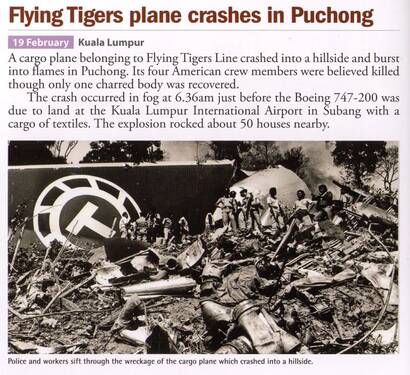
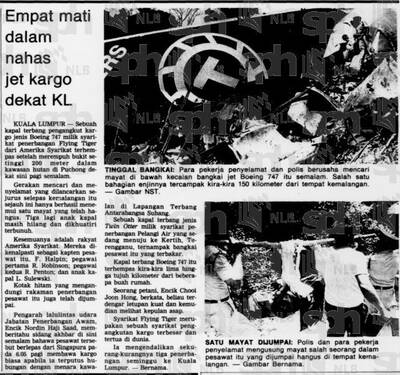
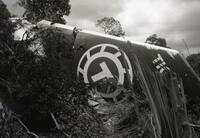
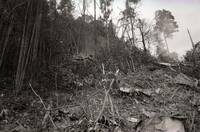
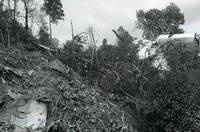
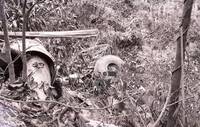
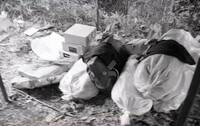
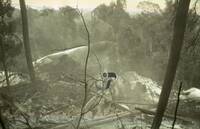
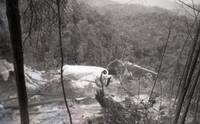
“Copyright to Jabatan Penerangan Malaysia.” (Ashmil Abd Ghani @ MalaysianWings, April 29, 2013: |"Flying Tiger Line Flight 66 Crashed in Puchong on 19 February 1989").
“On February 19, 1989, a Boeing 747-249F operating as Flying Tiger Flight 66 was flying an international cargo flight from Singapore to Kuala Lumpur, Malaysia. The aircraft impacted terrain 12 miles from the airport, resulting in 4 fatalities.
The aircraft was assigned an non-directional beacon (NDB) approach to Runway 33 at Sultan Abdul Aziz Shah Airport, Kuala Lumpur, after having flown 30 minutes from Singapore Changi Airport.[1] In descent, the flight was cleared to “Kayell” with a morse code of “KL” of which four separate points on the ground were commonly called by Malaysian ATC albeit with different frequencies. Two separate radio beacons were identically coded “KL” as well as the VOR abbreviation (Kuala Lumpur shortened to “KL”) and the airport was also sometimes referred to as “KL” by local ATC (instead of the full “Kuala Lumpur”). The crew was unsure to which point they were cleared, and the cockpit voice recorder revealed that the crew argued about which radios should be set to which frequencies and which approach was actually going to be conducted. (Even in the last few moments of the flight, the captain referenced the ILS approach for runway 33 which was notamed as inop on the flight release and the ATIS, additionally the crew was told by ATC that the ILS approach was not available.)
ATC radioed to the flight, “Tiger 66, descend two four zero zero [2,400 ft]. Cleared for NDB approach runway three three.” The captain of Tiger 66, who heard “descend to four zero zero” replied with, “Okay, four zero zero” (meaning 400 ft above sea level, which was 2,000 ft too low). The proper radio call from ATC, instead of “descend two four zero zero”, should have been “descend and maintain two thousand four hundred feet”. The captain read back “okay, four zero zero” where the proper read back should have been “Roger, descend and maintain four-hundred feet”. The Cockpit voice recorder[2] also revealed several communication errors made by the flight crew prior to this miscommunication and a revealed general casual nature of the Captain, who was the pilot-not-flying on this particular leg of the trip.
Numerous clear warnings were given by the on-board Ground Proximity Warning System all were ignored entirely by the crew, and the aircraft impacted a hillside 437 ft above sea level, killing all four people on board; two pilots, a flight engineer and an aircraft mechanic. The subsequent fire burned for two days[3].
The First Officer had complained that he did not have an approach plate in front of him and hadn't seen the approach. Additionally, the FO, who was the pilot flying at the time, expressed concern about conducting the NDB approach and indicated a preference for the ILS for runway 15. However, the FO was not assertive and no further action was taken. The Captain dismissed his concern saying he was familiar with the airport and the approaches. The second officer was 70 years old and used a magnifying glass to see.[citation needed] A contributing factor to this accident was the non-ICAO International Civil Aviation Organization phraseology used by Kuala Lumpur air traffic control and the Captain of the aircraft. This breakdown of communication contributed to the crew misinterpreting the instructions given. However, this notorious controlled-flight-into-terrain accident ultimately resulted from a crew failure to adhere to the instrument approach procedure, poor crew resource management and poor situational awareness.[1]
This accident caused the creation of the GPWS escape maneuver which all airlines now use[citation needed]. It further stressed the need for increased awareness and training of crew resource management techniques and standard operating procedures. This accident is used as an example of 'what not to do' by flight training organizations such as FlightSafety International. The FAA video production[4] using the original CVR is still used to study the events and how to improve current techinques. Much of this information is derived from that video.”
(Sumber: Not Avail @ Youtube, 9 Sept 2011: "BOEING 747 CRASH CVR COCKPIT VOICE RECORDING CFIT BLACK BOX RECORDING MALAYSIA CRASH").
1996-10-07: Hutan Simpan UPM
Sisa hutan yang masih tinggal (1,248 daripada 4,270.7 hektar keluasan asal) diletakkan di bawah seliaan UPM, dalam perjanjian 80 tahun dengan kerajaan negeri (1996-2076): “Pada 7 Oktober 1996 telah termetrinya Perjanjian antara UPM dan Kerajaan Negeri Selangor di mana Kerajaan Negeri Selangor telah menganugerahkan Hutan Simpan Air Hitam, Puchong kepada UPM untuk tempoh 80 tahun sebagai hutan pendidikan, penyelidikan dan pengembangan. Hutan Simpan Air Hitam, Puchong bukan sahaja boleh dimanfaatkan untuk tujuan akademik oleh pelajar UPM, malah terbuka kepada penyelidik perhutanan dari Institusi Pengajian Tinggi lain dari dalam dan luar negera. Hutan simpan yang meliputi kawasan seluas 1,248 hektar merupakan jenis Hutan Tanah Pamah yang dapat menyimpan khazanah ilmu yang berguna untuk dimanfaatkan oleh manusia sekiranya dieksploit sepenuhnya oleh penyelidik dan pengkaji di negara ini. Universiti Pertanian Malaysia akan menjadikan Hutan ini sebagai pusat penyelidikan perhutanan yang diuruskan dengan sistematik dan segala perancangan yang dibuat adalah berdasarkan kepada pengurusan hutan secara berkekalan tanpa mengganggu keadaan semulajadi hutan tersebut.” (Universiti Pertanian Malaysia, 1996: |"Laporan Tahunan 1996", m.s.64-65).
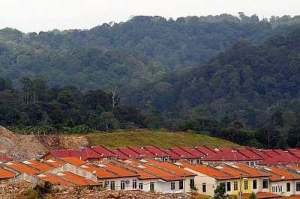
Setahun sebelumnya, pihak UPM telah kehilangan hasil penyelidikan mereka akibat sebahagian kawasan hutan ini telah dinyahwartakan bagi pembinaan perumahan: “Houses are creeping ever closer to the lush green slopes of the Ayer Hitam Forest Reserve in Selangor. – Picture by Lim Tow Ken ….. The number of applications received by the Selangor Forestry Department to convert the little that is left of the Ayer Hitam Forest Reserve into commercial use is in the “hundreds,” says director Nik Mohd Shah Nik Mustafa. The only thing preventing the department – which declined to reveal the actual number of applications – from signing away the tract of greenery in Puchong is a 1996 memorandum of understanding (MoU) which gives Universiti Putra Malaysia (UPM) “custody” of the reserve for 80 years for use in education and research. But with stacks of development proposals on the table, UPM scientists can but rest easy. They fear history may be repeated. In 1995, they had lost their original patch of research site in the forest reserve and with it, two decades’ worth of scientific work, when the Selangor Government took back the parcel of forest with the expiration of a 20-year lease. The old research site was given away for residential development.” (Tan Cheng Li @ The Star, 5/4/2005 @ National House Buyers Association (HBA): |"Better intact than fallen").
2006-05-25: Penyahwartaan Untuk Perkuburan
“Senarai hutan simpanan kekal yang telah dibatalkan untuk tujuan pembangunan dari tahun 2003 sehingga 2013: ….. Bil.: 4.; Hutan Simpan: Ayer Hitam; Keluasan (HA): 22.26; Tarikh Pembatalan: 25/5/2006; Tujuan: Tanah Perkuburan” (Rajiv A/l Rishyakaran, Dewan Negeri Selangor, Mesyuarat Kedua Penggal Pertama Dewan Negeri Selangor Tahun 2013, 08 Julai 2013: |"117) HUTAN").

Peta lokasi tapak cadangan perkuburan (Signature Campaign Teamwork (SCT) Saujana Puchong, 31 Disember 2007: |"Program SCT membantah Rancangan MPSJ MEMPERBESARKAN tanah perkuburan di Hutan Simpanan Ayer Hitam").
Perancangan serta penyahwartaan ini telah mendapat tentangan hebat dari penduduk setempat sejak kali pertama dilaporkan di akhbar sekitar tahun 2004. Setahun selepas itu, mereka menubuhkan Signature Campaign Teamwork (SCT) Saujana Puchong bagi menyusun kegiatan bantahan mereka, termasuk mengambil tindakan undang-undang. Hal ini telah beberapa kali mendapat perhatian media massa. Akhirnya, 6 tahun selepasnya (2010), kawasan tersebut telah diwartakan semula sebagai Hutan Simpan Ayer Itam (Tambahan).


Kiri: Peta lokasi tapak cadangan perkuburan, berdasarkan gambar satelit tahun 2007 (Ditandakan dengan sempadan biru): “The location from Google Earth” (Signature Campaign Teamwork (SCT) Saujana Puchong, 16 Ogos 2007: |"Protest in Lestari Puchong on 12 August 2007").
Kanan: Peta lokasi cadangan perkuburan, kini (Ditandakan dengan sempadan biru). Tampaknya kembali sebagaimana asalnya, dan masih terpelihara (Google Maps, 2024).
PERIHAL LANJUT: Hutan Simpan Ayer Itam Tambahan (2010-Kini)
2012-03-21: Pusat Pendidikan Perhutanan
Pada 21 Mac 2012, Sebuah pusat pendidikan perhutanan didirikan di pinggir Hutan Simpan Ayer Hitam (HSAH). Ia telah dirasmikan sebagai Pusat Pendidikan Perhutanan Sultan Idris Shah / Sultan Idris Shah Forestry Education Center (SISFEC):-
“It was launched by the UPM Chancellor, Sultan Sharafuddin Idris Shah on the 21st March 2012. This centre is located approximately 20 km from Universiti Putra Malaysia (UPM) Serdang, Selangor and 32 km from Kuala Lumpur. The centre landscape not only seems to be the refuge for many wildlife species especially small mammals and birds but is also a place that provides the populace in the Klang Valley as a green area for forest recreation.
…
During the field observation, it was told by the SISFEC staff that the area has been resided by the Orang Asli of Temuan tribe who relied heavily on the forest resources for their living over 400 years ago. However, they have been relocated to a modern village situated in Taman Saujana Puchong bordering this study site which resulted to the township development (Paiman and Amat, 2007). However, their settlements still can be seen and some of them still being used as a transit station when they entered the site to search for the forest resources where permission were granted for them to do so (as shown in Figure 10).”
(Sumber: Mohd Kher Hussein, Mohd Johari Mohd Yusof and Nor Syuriaty Jaafar @ Journal of Construction in Developing Countries, 25(2), 153–173, 2020: |"An Observational Study on Forest Landscape Conservation in Malaysia via the Establishment of Forestry Educational Centres", m.s.10, 17).
Ketika perasmian, Sultan Sharafudin berharap tempoh perjanjian hutan simpan UPM dilanjutkan daripada 80 tahun kepada 999 tahun:-
“Dalam titah perasmiannya, baginda berhasrat supaya kerajaan negeri Selangor mengubah tempoh perjanjian persefahaman hutan dengan UPM daripada 80 tahun pada masa sekarang kepada 999 tahun. “Lanjutan ini bagi memastikan fungsi hutan ini sebagai kawasan hijau, pusat pemeliharaan sumber genetik dan pusat pendidikan dan penyelidikan Fakulti Perhutanan UPM dapat diteruskan selamanya,” titah baginda. Sultan Sharafuddin juga bertitah agar semua pihak termasuk penduduk yang berjiran dengan hutan itu untuk turut sama melindungi dan melaporkan aktiviti yang boleh merosakkan hutan itu.”
“Berita disediakan oleh Khairul Anuar Muhamad Noh, Pejabat Pemasaran dan Komunikasi (MarComm) UPM. F0to disediakan oleh Mohd Azreen Awang & Mohd Hasrul Hamdan (MarComm).” (Universiti Putra Malaysia, 2012: |"Tuanku Canselor rasmi Pusat Pendidikan Perhutanan UPM").
2025: Ancaman Pembangunan Bukit Permatang Kumbang


Kiri: Peta kawasan sekitar Bukit Permatang Kumbang yang telah dinyahwartakan (1926) (Rujuk 1926-04-13: Penyahwartaan Awal).
Kanan: Peta kawasan sekitar Bukit Permatang Kumbang yang ingin dibangunkan (2025) (Cheng See Sin @ Facebook 蒲种大新闻(Puchong News Group), 18 November 2025: "Bantahan Projek Bukit Wawasan").
2025-11-18: Cetusan Bantahan Penduduk
“我最近參加發展商邀請出席的線上說明會,這個工程其實還在研究階段(可行性),看工程進行的話可能會引發的環境問題與解決方案。參與的居民都提出了反對的看法,比如開發山坡可能需要炸石,土崩(之前wawasan就出現嚴重的土崩問題),淹水問題,交通問題,還有這個工程預計15年裡完成,所以這15年居住在工地一帶居民可能會面對嚴重的交通阻塞問題。這個問題其實可以追溯到2008年之前的時候,其實是當時的州政府把這一片(紅線圈著的)森林保留地轉換成住宅和商業或其也用途地然後賣給發展商,當時引起居民的嚴重抗議,後來2008州政府變天之後,發展項目就被擱置了,現在發展商又想重新開啟這個項目。如果發展商沒有遇到大的阻力(居民的反對),這個項目就會進行,可能有些人會說只是一小片森林地,何必那麼大反應,其實發展的範圍剛剛好就涵蓋登山的範圍,如果這個項目順利進行,wawasan的爬山地點就會消失,更重要的是如果這一片原本的森林保留地成功被啟用,發展商與州政府肯定會再接再厲的把更多森裡保留地轉換成住宅和商業或其也用途地,屆時唯一提供新鮮空氣給我們puchong 人的森林都沒了。 如果大家愛惜自己的居住環境,請大家留意居民的抗爭活動,讓政府與發展商看到居民保衛家園的決心!”
Terjemahan oleh Facebook:-
“Baru-baru ini saya menghadiri sesi taklimat online yang dijemput oleh pemaju, projek ini sebenarnya masih dalam fasa penyelidikan (feasiibility) untuk melihat isu alam sekitar dan penyelesaian yang mungkin timbul jika projek itu berjalan. Penduduk yang terlibat telah mengemukakan bantahan, seperti kemungkinan letupan batu, tanah runtuh (wawasan pernah mengalami tanah runtuh yang serius sebelum ini), banjir, masalah trafik, dan projek itu dijangka siap dalam masa 15 tahun, jadi penduduk yang tinggal di tapak pembinaan selama 15 tahun mungkin menghadapi kesesakan lalu lintas yang serius. Masalah ini sebenarnya bermula sebelum 2008 apabila kerajaan negeri menukarkan hutan rizab ini (gegelung merah) kepada perumahan dan komersial atau juga tanah terpakai dan menjualnya kepada pemaju, menyebabkan bantahan serius daripada penduduk, dan kemudian pembangunan itu ditangguhkan selepas kerajaan negeri berubah 2008 dan sekarang pemaju mahu membuka semula projek itu. Jika pemaju tidak menemui rintangan yang besar (pembentangan penduduk), projek itu akan diteruskan, mungkin ada yang mengatakan ia hanya cebisan hutan yang kecil, kenapa reaksinya begitu besar. Malah, skop pembangunan memang tepat untuk meliputi kawasan pendakian gunung. Jika projek berjalan lancar, tapak pendakian gunung wawasan akan hilang. Lebih penting lagi, jika hutan simpan asli ini berjaya dibuka, memang susah payah pemaju dan negeri untuk menukarkan lebih banyak hutan simpan kepada perumahan dan komersial atau juga kegunaan. Hilang sudah satu-satunya hutan yang menyediakan udara segar kepada kami warga puchong.
Jika anda sayangkan persekitaran hidup anda, sila ambil perhatian kepada aktiviti bantahan penduduk supaya kerajaan dan pemaju dapat melihat kesungguhan penduduk mempertahankan rumah mereka!”
Terjemahan oleh Google Translate:-
“Baru-baru ini saya menghadiri taklimat dalam talian yang dianjurkan oleh pemaju. Projek ini masih dalam fasa kajian kebolehlaksanaan, dengan memberi tumpuan kepada potensi masalah dan penyelesaian alam sekitar. Penduduk yang mengambil bahagian telah mengemukakan bantahan, seperti potensi letupan untuk membangunkan lereng bukit, tanah runtuh (Wawasan sebelum ini mengalami tanah runtuh yang teruk), banjir, masalah lalu lintas, dan anggaran masa siap projek selama 15 tahun, yang boleh menyebabkan kesesakan lalu lintas yang teruk bagi penduduk yang tinggal berhampiran tapak pembinaan. Isu ini bermula sebelum tahun 2008 apabila kerajaan negeri menukar hutan simpan (dibulatkan dengan warna merah) ini kepada tanah kediaman dan komersial atau kegunaan lain dan menjualnya kepada pemaju. Ini mencetuskan protes serius daripada penduduk. Selepas pertukaran kerajaan pada tahun 2008, projek pembangunan itu ditangguhkan, dan kini pemaju mahu memulakannya semula. Jika pemaju tidak menghadapi tentangan yang ketara (bantahan penduduk), projek itu akan diteruskan. Ada yang mungkin berpendapat ia hanyalah sebahagian kecil hutan, jadi mengapa reaksi besar? Walau bagaimanapun, kawasan pembangunan itu kebetulan merangkumi laluan mendaki. Jika projek ini berjalan lancar, tempat mendaki Wawasan akan hilang. Lebih penting lagi, jika hutan simpan asal ini berjaya ditukar, pemaju dan kerajaan negeri pasti akan meneruskan usaha mereka untuk menukar lebih banyak hutan simpan kepada kegunaan kediaman, komersial atau kegunaan lain. Pada ketika itu, satu-satunya hutan yang menyediakan udara segar untuk penduduk Puchong akan lenyap.
Jika semua orang menghargai persekitaran tempat tinggal mereka, sila beri perhatian kepada protes penduduk dan biarkan kerajaan dan pemaju melihat keazaman penduduk untuk melindungi rumah mereka!”
(Cheng See Sin @ Facebook 蒲种大新闻(Puchong News Group), 18 November 2025: "Bantahan Projek Bukit Wawasan").
2025-11-23: Perancangan Bantahan Rasmi



“Kenyataan Pengerusi
Jawatankuasa ProTem Bantahan Pembangunan Hutan Simpan Ayer Hitam
Tarikh: 23 November 2025
Selamat pagi kepada semua penduduk, pencinta alam dan rakan-rakan sekalian,
Selepas hari yang panjang dan penuh makna semalam, saya ingin merakamkan setinggi-tinggi penghargaan kepada semua penduduk dan wakil Persatuan Penduduk (RA) yang telah mengambil bahagian dalam sesi tandatangan petisyen. Semangat dan komitmen anda amat mengagumkan.
Sehingga jam 11.00 pagi, kami telah merekodkan sebanyak 734 tandatangan membantah pembangunan, dengan tiada bantahan direkodkan. Sokongan yang begitu besar ini menunjukkan kekuatan suara komuniti kita.
Saya akan mengadakan lawatan ke MBSJ dan ASPEC bagi memohon secara rasmi agar tarikh akhir penyerahan dilanjutkan, supaya semua maklum balas dan dokumen dapat dikaji dengan teliti.
Saya amat berbesar hati dan rendah diri menerima pelantikan sebagai Pengerusi Jawatankuasa ProTem Bantahan Pembangunan Hutan Simpan Ayer Hitam, dan akan menjalankan tanggungjawab ini dengan penuh dedikasi.
Setelah semua maklumat berkaitan dikumpulkan, saya akan menganjurkan satu mesyuarat rasmi untuk merancang langkah seterusnya.
Dengan kekuatan dan sokongan yang kita miliki sekarang, saya percaya Kerajaan Negeri akan mula membuka mata dan mendengar suara kita demi memelihara kawasan hijau ini untuk generasi akan datang.
Terima kasih atas kepercayaan dan sokongan anda semua.
Yang benar,
Pengerusi
Jawatankuasa ProTem Bantahan Pembangunan Hutan Simpan Ayer Hitam
to all hiker please support bantahan 2.0”
(Sumber: Hadi Adisk @ Facebook Hiking And Recreation around Malaysia ( H.A.R.A.M), 27 November 2025: "Chairman’s Statement").
2025-12-16: Maklumbalas Pihak Kerajaan
“Sebuah kawasan seluas kira-kira 67.6 hektar berhampiran Rizab Hutan Ayer Hitam di Kinrara Puchong bukan lagi Hutan Simpanan Kekal. Exco Kesihatan Awam dan Alam Sekitar Selangor, Jamaliah Jamaluddin berkata, pejabatnya telah mengesahkan status tanah itu bersama Jabatan Perhutanan Negeri Selangor susulan dakwaan kawasan terletak dalam Dewan Undangan Negeri (DUN) Kinrara dan Parlimen Subang itu masih merupakan hutan. 'Hasil semakan mendapati tanah tersebut pada asalnya sebahagian daripada Hutan Simpan Ayer Itam yang diwartakan pada tahun 1906 (Warta Kerajaan), namun pada tahun 1926, kawasan itu telah dinyahwarta menjadi tanah kerajaan dan seterusnya diberi milik,' katanya dalam satu kenyataan pada Selasa. Jamaliah berkata, perkara ini turut dimaklumkan kepada Pejabat ADUN Kinrara, Ng Sze Han yang prihatin terhadap status tanah itu dan telah membuat permohonan rasmi untuk mendapatkan pengesahan.”

Jamaliah Jamaluddin, Exco Kesihatan Awam dan Alam Sekitar Selangor.
“Dalam pada itu katanya, Majlis Bandaraya Subang Jaya (MBSJ) memaklumkan pihaknya belum menerima sebarang permohonan pembangunan bagi kawasan tersebut. 'Kerajaan negeri menghargai keprihatinan orang awam dan pertubuhan masyarakat sivil terhadap usaha pemeliharaan alam sekitar. 'Setiap keputusan yang dibuat akan berlandaskan fakta, peruntukan perundangan serta kepentingan jangka panjang negeri dan rakyat,' ujarnya.”
(Sumber: MOHD IZZATUL IZUAN TAHIR @ Sinar Harian, 16 Disember 2025: |"67.6 hektar di Kinrara bukan lagi Hutan Simpanan Kekal").
Reaksi Jawatankuasa Bantahan
“Jawatankuasa sementara membantah pembangunan Bukit Permatang Kumbang mempertikai penjelasan Ahli Exco Selangor, Jamaliah Jamaluddin berkaitan status tanah seluas kira-kira 169 ekar berhampiran Rizab Hutan Ayer Hitam di Kinrara, Puchong. Awies Wong berkata penduduk tidak menolak fakta dalam penjelasan Jamaliah, tetapi sebarang kesimpulan yang dibuat kerajaan perlu mengambil kira keseluruhan kronologi berhubung status kawasan itu. 'Penjelasan Jamaliah jelas tidak lengkap kerana dia tiada keseluruhan kronologi sebenar, khususnya berhubung dakwaan pajakan sejak 1926. 'Penduduk telah pun mengemukakan permohonan rasmi melalui pejabat Ahli Parlimen Subang Wong Chen, yang bersetuju untuk mendapatkan dan mendedahkan kronologi penuh pembangunan tanah tersebut daripada Kerajaan Selangor. “Kami tidak mahu berspekulasi tapi mahu tunggu kronologi penuh. Bila semuanya didedahkan, barulah wajar untuk semua pihak memberi komen secara bertanggungjawab,” katanya kepada Malaysiakini. Sebahagian besar tanah itu terletak bawah kawasan parlimen Wong Chen. Awies diminta mengulas kenyataan Jamaliah bahawa kawasan tersebut sudah lama tidak berstatus Hutan Simpanan Kekal, iaitu selama 99 tahun. …..”
“Mengulas lanjut, Awies berkata Wong Chen dijangka berkongsi kronologi penuh pembangunan di kawasan tersebut pada awal Januari depan selepas surat dihantar kepada kerajaan negeri, dan penduduk memilih untuk menunggu fakta lengkap sebelum mengulas lanjut. Katanya lagi, maklumat berkenaan tidak seharusnya dirahsiakan kerana ia melibatkan kepentingan awam dan alam sekitar. Terdahulu, Wong Chen menuntut Kerajaan Selangor mendedahkan kronologi sejarah tanah berhampiran Hutan Simpan Ayer Hitam di Kinrara, Puchong yang dikatakan akan dimajukan. Dia juga menuntut harga transaksi tanah didedahkah atas kebimbangan “kos pengambilalihan yang mungkin ditanggung oleh pembayar cukai”.
Awies berkata Jamaliah, selaku Exco yang memegang portfolio kesihatan awam, alam sekitar, perubahan iklim dan teknologi hijau, ada tanggungjawab moral dan politik untuk melindungi keselamatan rakyat. 'Penebangan 169 ekar hutan bukan isu kecil atau setempat. Ia memberi kesan kepada perubahan iklim, kesihatan awam dan keselamatan komuniti. 'Penduduk kecewa kerana corak yang sama berulang - pembangunan dinafikan pada peringkat awal, namun hanya diakui selepas pendedahan media. 'Janji lama kerajaan negeri bahawa tiada pembangunan di kawasan bukit sekitar Puchong kini dilihat sekadar retorik, apabila alasan lama kembali digunakan bahawa kawasan tersebut kononnya bukan sebahagian daripada Hutan Simpan,' katanya. Dia berkata isu tersebut bukannya tentang soal teknikal atau dokumen lama, tetapi berkenaan kehendak politik dan rasa bertanggungjawab terhadap rakyat. Sebagai penyelesaian, Awies mencadangkan agar kerajaan negeri menggunakan kuasa yang ada untuk membeli semula Bukit Permatang Kumbang - yang termasuk dalam kawasan itu - daripada pemaju dan mewartakannya sebagai hutan simpan.”
(Sumber: B Nantha Kumar @ Malaysiakini, 20 Disember 2025: |"'Tanah hutan’ Ayer Hitam: Penduduk tolak penjelasan exco, tunggu kronologi penuh").
Keadaan Kini
Secara umumnya, di bawah seliaan UPM dan SISFEC, kawasan hutan yang tinggal kini adalah dalam keadaan baik dan dianggap contoh rehabilitasi hutan yang agak berjaya:-
“According to Faridah-Hanum (2009), this forest is in the late stages of regeneration and fast reaching its climax. The remaining seedlings and saplings have reached timber size, and its natural landscape forest was classified as a disturbed Kelat-Kedondong-Mixed Dipterocarp type of lowland forest (Faridah-Hanum, 1999). In
2015, it was reported that the site features some 430 flowering plant species, 33 fern species, 127 timber species and 99 herb species (The Star Online, 2015). Authors also noticed that SISFEC had implemented silviculture activities to ensure the health of their forest trees. Silviculture is the art and science of controlling the establishment, growth, composition, health, and quality of forests and woodlands to meet the diverse needs and values of landowners and society on a sustainable basis (Adams et al., 1994). Trees cutting were strictly not allowed in this area. Thus, it can be said that SISFEC has pleased the conservation criteria and indicators of biodiversity.
SISFEC had proved that human intervention in natural setting causes to environment degradation and losses of biodiversity as well as affect the beauty of the area previously. However, after the site being protected and conserved, the forest vegetations growth well and healthy as well as it still manages to retain a great deal of its original rainforest character that enhance back their biodiversity and beauty. Hence, the disaster landscapes forest can be rehabilitated if good planning and management being incorporated and implemented.”
(Sumber: Mohd Kher Hussein, Mohd Johari Mohd Yusof and Nor Syuriaty Jaafar @ Journal of Construction in Developing Countries, 25(2), 153–173, 2020: |"An Observational Study on Forest Landscape Conservation in Malaysia via the Establishment of Forestry Educational Centres", m.s.11).


Persempadanan Hutan Simpan Kekal (HSK) Ayer Hitam secara kasar (ditandakan merah), berdasarkan lakaran peta tahun 2020:-
Kiri: Lakaran peta tahun 2020 (ADITYA, Haidar Fari et al. AGRIVITA Journal of Agricultural Science, [S.l.], v. 42, n. 3, p. 548-562, oct. 2020: |"Characterization, Changes in Soil Properties and Vegetation Distribution as Affected by Topography in Ayer Hitam Forest Reserve, Selangor, Peninsular Malaysia").
Kanan: Persempadanan Hutan Simpan Kekal (HSK) Ayer Hitam secara kasar (ditandakan merah) (Google Maps, 2024).
Pemandangan Hutan Simpan Ayer Hitam, menghadap ke selatan, di pinggir Bandar Puteri: “Ayer Hitam Forest Reserve ( 360 view of Bandar Puteri )” (曼谷Expats自駕走遍泰國 , 13 Oct 2017: "Ayer Hitam Forest Reserve ( 360 view of Bandar Puteri )").

